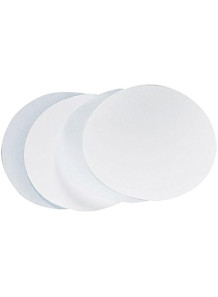Fiberglass Filter Membrane 350mm (1pcs)
- Product Code: 125781
widely used in laboratory settings for their unique properties and effectiveness in various filtration applications
Customized pore size

widely used in laboratory settings for their unique properties and effectiveness in various filtration applications
Customized pore size
Fiberglass filter membranes, also known as glass fiber filters, are widely used in laboratory settings for their unique properties and effectiveness in various filtration applications. These filters are made from fine fibers of glass and are characterized by their high capacity for holding particulates, thermal stability, and resistance to chemical attack.
Key Features of Fiberglass Filter Membranes:
-
High Particle Retention Capacity: Fiberglass filters have a high surface area and depth structure, which allows them to capture and retain a large number of particulates. This makes them suitable for applications where high loading capacity is needed.
-
Wide Range of Pore Sizes: These membranes are available in a range of pore sizes, typically from 0.7 µm to 3.1 µm, allowing for flexibility in choosing the right filter for specific applications.
-
Thermal Stability: Glass fiber filters can withstand high temperatures (up to about 500°C), which makes them suitable for applications involving hot gases or liquids and for processes that require sterilization or drying.
-
Chemical Resistance: They are resistant to most organic solvents and aggressive chemicals, except for strong acids such as hydrofluoric acid, which can dissolve glass fibers.
-
Low Extractables: Fiberglass filters have low levels of extractable impurities, reducing the risk of contamination during filtration.
-
High Flow Rate and Throughput: The porous structure of fiberglass filters allows for a high flow rate and throughput, making them efficient for filtering large volumes quickly.
-
Mechanical Strength: These filters provide good mechanical strength and structural integrity, making them suitable for vacuum and pressure filtration.
Uses of Fiberglass Filter Membranes in Laboratories:
-
Air Monitoring and Particulate Analysis: Fiberglass filters are widely used in air sampling to collect particulates from ambient air, industrial exhausts, or cleanroom environments. They are also used for gravimetric analysis to determine the weight of captured particulates.
-
Prefiltration: Due to their high dirt-holding capacity, glass fiber filters are often used as prefilters to remove coarse particles before finer filtration stages. This helps protect and extend the life of more expensive, finer filters downstream.
-
Environmental Testing: In environmental laboratories, fiberglass filters are used to filter water and soil samples for the analysis of suspended solids, metals, or other contaminants.
-
HPLC Sample Preparation: They are used in high-performance liquid chromatography (HPLC) sample preparation to remove particulates that could interfere with the analysis or damage the instrument.
-
Protein Precipitation and Clarification: Fiberglass filters are effective in filtering cell cultures and biological samples to remove proteins, cells, and debris. They can be used to clarify serum and other biological fluids.
-
Hot Gas Filtration: Due to their thermal stability, fiberglass filters are suitable for filtering hot gases in industrial and laboratory processes, such as in stack gas analysis or filtration of combustion gases.
-
Liquid Filtration: They are also used in the filtration of liquids where high particulate load or high flow rates are required, such as in the filtration of cell culture media, fermentation broths, or environmental water samples.
-
Microbiological Testing: In microbiology, fiberglass filters can be used for the recovery and analysis of microorganisms from water and air samples, especially in applications that do not require sterile conditions.
Considerations for Use:
-
Pore Size Selection: Choose an appropriate pore size based on the application, ensuring that the filter can effectively capture the desired particles without clogging too quickly.
-
Chemical Compatibility: Ensure compatibility with the chemical nature of the sample to avoid degradation of the filter or contamination of the sample.
-
Temperature Conditions: Be mindful of the temperature limits of fiberglass filters, especially when filtering hot gases or autoclaving.
-
Handling: Fiberglass filters can shed small glass fibers, so it is important to handle them carefully, especially in cleanroom environments or when preparing samples for sensitive analysis.
| Mechanism | - |
| Appearance | - |
| Longevity | - |
| Strength | - |
| Storage | - |
| Shelf Life | - |
| Allergen(s) | - |
| Dosage (Range) | - |
| Recommended Dosage | - |
| Dosage (Per Day) | - |
| Recommended Dosage (Per Day) | - |
| Mix Method | - |
| Heat Resistance | - |
| Stable in pH range | - |
| Solubility | - |
| Product Types | - |
| INCI | - |
Purchase History for
Cart
No products



